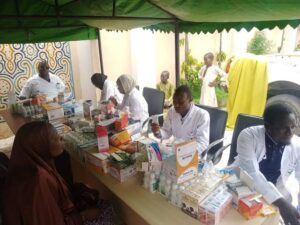


FG launches second antimicrobial resistance national action plan, genomics surveillance strategy
By Matthew Denis
The Federal Government in collaboration with key stakeholders has launched two pivotal strategic documents the second Antimicrobial Resistance National Action Plan (AMR NAP) and the National Genomics Surveillance Strategy on Friday.
Speaking during the event in Abuja, the Coordinating Minister of Health and Social Welfare, Prof. Ali Pate stated that this is a landmark moment in our collective fight against one of the most serious public health threats of our time. AMR, the silent but devastating resistance of microorganisms to antimicrobial treatments, presents a clear and present danger to global health, food security, and development.
He said “Around the world, antimicrobial resistance is growing at an alarming rate, endangering decades of medical progress. AMR threatens the very foundation of modern medicine, rendering routine procedures, surgeries, and treatments less effective, and at times, ineffective. It is estimated that by 2050, if no action is taken, AMR could cause 10 million deaths annually, surpassing even cancer as a leading cause of mortality. The economic consequences are equally dire, with projections estimating global losses of over $100 trillion.
“The launch of AMR NAP 2.0 comes at a time when the global community, through platforms like the 2024 United Nations General Assembly (UNGA), has committed to renewed and urgent action against AMR. These commitments highlight the global consensus that AMR cannot be fought in isolation, nor can it be delayed any further.”
According to him the time for action is now. AMR is a threat that knows no borders, and our response must be equally far-reaching. Nigeria has a critical role to play in protecting global public health, and it is only through collaborative, sustained efforts that we will succeed.
The Minister called on all stakeholders, health professionals, farmers, industry leaders, policymakers, and community members, to join hands in this fight. Every prescription, every farm practice, and every policy matters. It is through collective action that we will preserve the efficacy of antimicrobials for future generations.
He said “I am confident that AMR NAP 2.0 will be a decisive step towards securing a healthier, safer future for all Nigerians. Let this launch be a prelude to the Renewed Hope Agenda of His Excellency Mr President, Bola Ahmed Tinubu, and a call to action, for every sector that plays a role in addressing this threat.Together, we will overcome the challenge of AMR and build a stronger, healthier Nigeria.
Earlier while making his speech, the Director General of Nigeria Centre for Disease Control and Prevention, Dr. Jide Idris explained that the second AMR National Action Plan is a comprehensive 5-year strategy designed to combat antimicrobial resistance in Nigeria, outlining key actions towards strengthening enforcement of regulations aimed at addressing the drivers of AMR.
“Raise awareness through targeted communication campaigns
Enhance the use of data for better understanding and response to AMR trends improve infection prevention and control in healthcare facilities, and hygiene practices in communities, farms, and markets and ensure access to high-quality diagnostics and antibiotics for Nigerians when needed.
“As the coordinating agency for Nigeria’s nationwide efforts to combat AMR, the NCDC leads the Antimicrobial Resistance Coordination Committee (AMRCC) to drive the implementation of the plan’s priority actions.
“The AMR NAP emphasizes collaboration between the Nigerian government, the private sector, international organizations, and local communities in the fight against AMR, reinforcing the urgency of a united response to safeguard public health.
“The National Genomics Surveillance Strategy further strengthens Nigeria’s pandemic preparedness using innovative genomic approaches. “
He stressed that the objectives are building a robust national genomic network for improved health outcomes
Utilizing genomics for comprehensive population data and biospecimen resources.
“Enhancing preparedness for emerging infectious diseases with epidemic potential through these strategies, Nigeria aims to significantly enhance health security and contribute to the realization of Agenda 2063 and the Sustainable Development Goals (SDGs).”
The highlights of the event was to have a collaborative measures with government agencies, WHO, USAID, FAO, CHAI among others to ensure robust funding and effective curtailing of AMR in the country.



